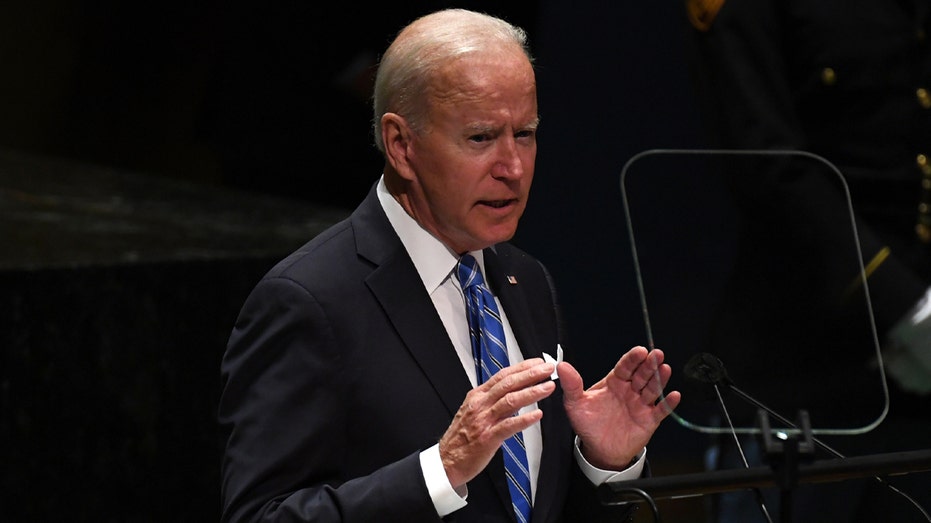Supreme Court 'aims to take our country backwards' with EPA ruling, Biden says
Biden said the Supreme Court is trying to take the country 'backwards' with EPA ruling foiling his climate change agenda
Biden has done everything to thwart US energy production: Rep. Fleischmann
Rep. Chuck Fleischmann, R-Tenn., discusses Biden's energy policy, the Supreme Court's decision on EPA regulation and fallout over Roe v. Wade reversal.
President Joe Biden slammed the Supreme Court Friday for its Thursday ruling that the Environmental Protection Agency cannot pass regulations that could overhaul entire industries without additional congressional approval, saying the high court "aims to take our country backwards," while stressing that his administration will "leverage every authority" to "tackle the climate crisis."
"Yesterday’s Supreme Court ruling in West Virginia vs. EPA aims to take our country backwards. Our fight against climate change must carry forward," Biden tweeted Friday morning.
"My Administration and I will leverage every authority to protect public health, keep our air clean, and tackle the climate crisis," he said.
SUPREME COURT DEALS BIDEN CLIMATE AGENDA SERIOUS BLOW WITH EPA DECISION
The 6-3 decision limits how far the executive branch can go in forcing new environmental regulations on its own.

NEW YORK, NEW YORK - SEPTEMBER 21: U.S. President Joe Biden addresses the 76th Session of the U.N. General Assembly on September 21, 2021 at U.N. headquarters in New York City. More than 100 heads of state or government are attending the session in p ((Photo by Timothy A. Clary-Pool/Getty Images) / Getty Images)
"Capping carbon dioxide emissions at a level that will force a nationwide transition away from the use of coal to generate electricity may be a sensible ‘solution to the crisis of the day,’ But it is not plausible that Congress gave EPA the authority to adopt on its own such a regulatory scheme in Section 111(d)," Chief Justice John Roberts said in the Court's opinion, referencing Section 111 of the Clean Air Act. "A decision of such magnitude and consequence rests with Congress itself, or an agency acting pursuant to a clear delegation from that representative body."
The case stemmed from the Obama administration’s 2015 Clean Power Plan, which aimed to reduce carbon emissions at power plants by pushing a shift from coal, to natural gas, and ultimately to wind and solar energy.
The plan was put on hold by the Supreme Court in 2016, and then repealed by the Trump administration and replaced by the less extreme Affordable Clean Energy (ACE) Rule.

FILE - In this Jan. 11, 2017, file photo, Environmental Protection Agency (EPA) Administrator Gina McCarthy, speaks during a news conference at the Justice Department in Washington. President-elect Joe Biden is set to pick McCarthy as domestic climat
After President Biden took office, the ACE Rule became the subject of litigation which led to the D.C. Circuit Court of Appeals vacating that rule as well as the repeal of the Clean Power Plan. However, the Biden EPA has stated that it will not reinstate the Clean Power Plan, opting instead to develop and implement its own plan.
The question of how much power the EPA has was based on a provision in Section 111 of the Clean Air Act, which grants the EPA power to set "standards of performance" for existing sources of air pollutants as long as they take into account cost, energy requirements, and non-air health and environmental impacts.
The Trump EPA, in repealing the Clean Power Plan, took the position that Section 111 only let them determine measures to be implemented at the physical power plants themselves (an "inside-the-fence-line" restriction) and not broadly-applied measures for entire industries.
BIDEN ADMIN MISSES MAJOR OIL LEASE DEADLINE: 'AN ABSOLUTE DISGRACE'
Justice Elena Kagan dissented in the ruling, along with Justices Stephen Breyer and Sonia Sotomayor. Kagan described the seriousness of climate change and the risks posed if significant change is not made when it comes to carbon emissions.
"Congress charged EPA with addressing those potentially catastrophic harms, including through regulation of fossil fuel-fired power plants," Kagan wrote.

FILE: The U.S. Supreme Court building is shown, May 4, 2022 in Washington. (AP Photo/Alex Brandon, File / AP Newsroom)
The dissent argued that Section 111 indeed authorizes the EPA to make broad changes because it allows the EPA to choose the "best system of emission reduction."
"The ‘best system’ full stop — no ifs, ands, or buts of any kind relevant here," Kagan said.
CLICK HERE TO GET THE FOX NEWS APP
Kagan also echoed an argument made during oral arguments by U.S. Solicitor General Elizabeth Prelogar that there was no reason for the Court to even hear this case given that the Clean Power Plan no longer exists, and the Biden administration is working on a new plan.
"Yet this Court determined to pronounce on the legality of the old rule anyway," Kagan said, adding that "because no one is now subject to the Clean Power Plan’s terms, there was no reason to reach out to decide this case." Kagan said that the majority opinion "is really an advisory opinion on the proper scope of the new rule EPA is considering," and that the Court "could not wait — even to see what the new rule says — to constrain EPA's efforts to address climate change."
Fox News' Ronn Blitzer contributed to this report.





















